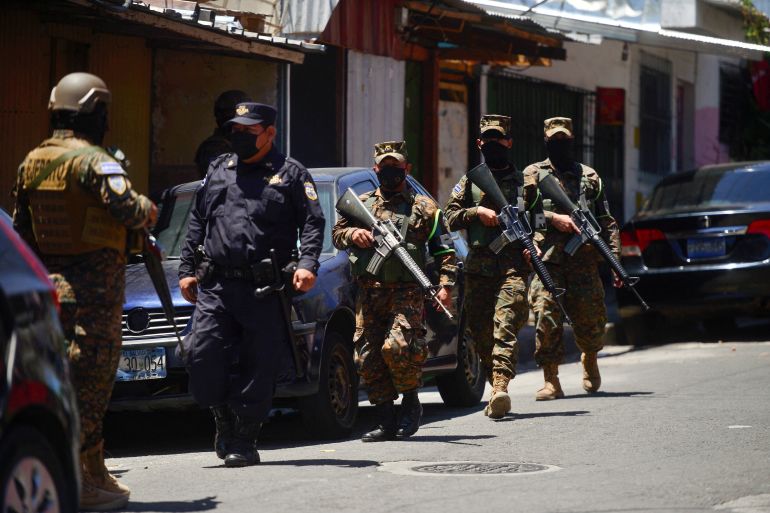El Salvador’s Bukele warns gangs lead to ‘prison or death’
President’s comments come as country cracks down on gang membership after wave of murders last weekend.

President Nayib Bukele has warned parents in El Salvador to keep their children away from gangs to avoid “prison or death”, as the country cracks down on gang membership after dozens of people were killed last weekend in a surge in violence.
Bukele posted a video on Twitter on Thursday showing the tough conditions in Salvadoran prisons, including some inmates sleeping on the floor in crowded cells and complaining about food rationing and a lack of sanitation.
Keep reading
list of 3 itemsEl Salvador declares state of emergency after gang killings
Pegasus used to target El Salvador activists, journalists: Report
“To parents. Show your teenage children this video, explain to them that joining a gang leaves only two options: prison or death,” the president wrote.
Bukele’s comments come after members of his governing party pushed through substantial increases in prison sentences on Wednesday in response to the killings of more than 80 people during the weekend.
Sixty-two people were killed on Saturday alone – the highest single-day tally in decades – in a surge of violence that the government blamed on gangs.
Under the new rules, convicted gang lords will now be sentenced to 40 to 45 years in jail, compared with six to nine years previously, while other gang members will be sentenced to 20 to 30 years, up from three to five years earlier.
“These reforms are intended to impose harsh penalties for these terrorists who believe they’re above authority and play with the lives of Salvadorans,” Justice and Security Minister Gustavo Villatoro told reporters.
The country’s parliament also approved a “state of exception” on Sunday in the aftermath of the killings, a move that suspends certain civil liberties, including the right to association and the right to legal counsel.
In the past days, some 2,500 alleged gang members have been captured by police for possible “acts of terrorism”, and Bukele has ordered tougher measures in prisons and flooded neighbourhoods with soldiers and military personnel.
There are more than 16,000 gang members in jails in El Salvador, where they only receive two meals a day. The two main criminal groups, Mara Salvatrucha – more commonly referred to as MS-13 – and Barrio 18, have an estimated 70,000 members between them.
While Bukele’s government has touted the recent measures, experts have criticised the decision to invoke the state of emergency and questioned the state’s approach to gang violence.
It is unclear whether “tactics that we’ve had in a cyclical form since the 1990s – but that are each time even more draconian, brutal and violent” would work, said Miguel Cruz, director of research at Florida International University’s Kimberly Green Latin American and Caribbean Center and an expert on El Salvador’s gangs.
“What they do is simply perpetuate the interminable cycle of violence and the chronic insecurity,” Cruz told Al Jazeera earlier this week.
Amnesty International said on Wednesday that while it recognises the threat to public safety criminal groups create in El Salvador, the emergency decree “suspends human rights that cannot be restricted under any circumstance”.
“These include the right of detained persons to legal defence, and the right to be informed of the reasons for an arrest,” the group said on Twitter.
“We call on President Nayib Bukele and the state of El Salvador to listen to the concerns of civil society and ensure that the design and implementation of public security policies respect human rights.”